|
|
|
Sort Order |
|
|
|
Items / Page
|
|
|
|
|
|
|
| Srl | Item |
| 1 |
ID:
129443
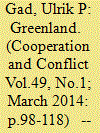

|
|
|
|
|
| Publication |
2014.
|
| Summary/Abstract |
The relationship between Greenland and the European Union (EU) can best be understood by exploring the development from Danish colonialism to a future independent Greenlandic state. In 1985, Greenland became the first territory ever to leave the European Economic Community (EEC) when it opted for status as an 'overseas country or territory'. The manner in which Greenland had to follow Denmark into the EEC in 1973 - whereby Greenlanders saw control over their fisheries move from distant Copenhagen to even-more-distant Brussels - was pivotal for the Greenlandic demands for home rule that succeeded in 1979 and made the 1985 withdrawal possible. On 25 November 2008, a majority of the people of Greenland voted in favour of enhanced home rule - 'self-government' - still within formal Danish sovereignty. Denmark and Greenland alike are preparing for a future envisioned as involving climate change, intensive raw material extraction, new transportation corridors and new claims to sovereignty over the Arctic. Greenland uses this imagined future as a way of enhancing its subjectivity, not the least when dealing with the EU. This article analyses how the Greenlandic self-understanding as being on the way to sovereignty - and the tensions involved - structures the triangular relationship between the EU, Greenland and Denmark. The article concludes that the visions of sovereign equality might, on the one hand, create greater expectations than Greenland will immediately be able to live up to - at home and in the EU. On the other hand, the representation of the Greenland-EU relationship as one of sovereign equality - present and future - might just be able to provoke the resources necessary to make the dream come true.
|
|
|
|
|
|
|
|
|
|
|
|
|
|
|
|
| 2 |
ID:
101279
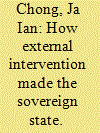

|
|
|
|
|
| Publication |
2010.
|
| Summary/Abstract |
From post-World War II decolonization to establishing order in war-torn polities today, external intervention can play an important role in fostering sovereign statehood in weak states. Much attention in this regard emphasizes local reactions to outside pressures. This article augments these perspectives by drawing attention to ways that foreign actors may affect the development of sovereignty through their efforts to work with various domestic groups. Structured comparisons of China and Indonesia during the early to mid-twentieth century suggest that active external intercession into domestic politics can collectively help to shape when and how sovereignty develops. As these are least likely cases for intervention to affect sovereign state making, the importance of foreign actors indicates a need to reconceptualize the effects of outside influences on sovereignty creation more broadly.
|
|
|
|
|
|
|
|
|
|
|
|
|
|
|
|
| 3 |
ID:
139365
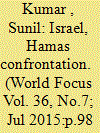

|
|
|
|
|
| Summary/Abstract |
So far as Israel and Hamas is concerned, no peaceful or co-operative chemistry or relationship exist between them. The two share a hostile and antagonistic posture to each other that involves armed confrontation, political struggle and accusations of terror strikes. Furthermore, while one is a state actor, because in 1948, Israel had become a sovereign state, many countries had given recognition immediately.
|
|
|
|
|
|
|
|
|
|
|
|
|
|
|
|
| 4 |
ID:
105025
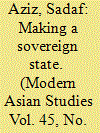

|
|
|
|
|
| Publication |
2011.
|
| Summary/Abstract |
This paper takes a critical look at a recent attempt by the Pakistani state to manage religious thought and practice, under the broad banner of 'Enlightened Moderation'. One of the key Islamic thinkers associated in popular imagination with this project is Javed Ahmed Ghamidi. In contextualizing the work and role of Ghamidi, it is tempting to work backwards from his opinions on Islamic truth to situate him as a reformer whose interventions are primarily oriented to the task of reconciling Islam to conditions of liberal modernity. Against such a tendency it is argued here that such an exercise of classification and categorization needs to be undertaken with greater care as against a critique of the imperialist typology of 'good' and 'bad' Islams, a project of delineating authentic from inauthentic Islams has also more recently been activated.
|
|
|
|
|
|
|
|
|
|
|
|
|
|
|
|
| 5 |
ID:
102536
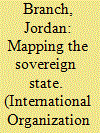

|
|
|
|
|
| Publication |
2011.
|
| Summary/Abstract |
This article examines the effect of cartography on the development of the modern state system. I argue that new mapping technologies in early modern Europe changed how actors thought about political space, organization, and authority, thus shaping the creation of sovereign states and international relations. In particular, mapping was fundamental to three key characteristics of the medieval-to-modern shift: the homogenization of territorial authority, the linearization of political boundaries, and the elimination of nonterritorial forms of organization. Although maps have been interpreted as epiphenomenal to political change, each of these three transformations occurred first in the representational space of maps and only subsequently in the political practices of rulers and states. Based on evidence from the history of cartographic technologies and their use by political actors, the practices and texts of international negotiations, and the practical implementation of linearly bounded territoriality by states, this article argues that changes in the representational practices of mapmaking were constitutive of the early-modern transformation of the authoritative structure of politics. This explanation of the international system's historical transformation suggests useful new directions for investigations into the possibility of fundamental political change due to the economic, social, and technological developments of globalization.
|
|
|
|
|
|
|
|
|
|
|
|
|
|
|
|
| 6 |
ID:
123980
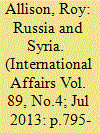

|
|
|
|
|
| Publication |
2013.
|
| Summary/Abstract |
This article explores explanations of Russia's unyielding alignment with the Syrian regime of Bashar al-Assad since the Syrian crisis erupted in the spring of 2011.
Russia has provided a diplomatic shield for Damascus in the UN Security Council and has continued to supply it with modern arms. Putin's resistance to any scenario of western-led intervention in Syria, on the model of the Libya campaign, in itself does not explain Russian policy. For this we need to analyse underlying Russian motives. The article argues that identity or solidarity between the Soviet Union/Russia and Syria has exerted little real influence, besides leaving some strategic nostalgia among Russian security policy-makers. Russian material interests in Syria are also overstated, although Russia still hopes to entrench itself in the regional politics of the Middle East.
Of more significance is the potential impact of the Syria crisis on the domestic political order of the Russian state. First, the nexus between regional spillover from Syria, Islamist networks and insurgency in the North Caucasus is a cause of concern-although the risk of 'blowback' to Russia is exaggerated. Second, Moscow rejects calls for the departure of Assad as another case of the western community imposing standards of political legitimacy on a 'sovereign state' to enforce regime change, with future implications for Russia or other authoritarian members of the Commonwealth of Independent States.
Russia may try to enshrine its influence in the Middle East through a peace process for Syria, but if Syria descends further into chaos western states may be able to achieve no more in practice than emergency coordination with Russia.
|
|
|
|
|
|
|
|
|
|
|
|
|
|
|
|
| 7 |
ID:
132111
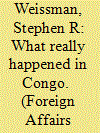

|
|
|
|
|
| Publication |
2014.
|
| Summary/Abstract |
It didn't take long for Congo's transition from Belgian colony to sovereign state to turn ugly. Both the Soviet Union and the United States were keeping a close eye on the mineral-rich country at the heart of Africa when, on June 30, 1960, it gained independence under a democratically elected government headed by Prime Minister Patrice Lumumba. A charismatic nationalist, Lumumba led the only party in parliament with a nationwide, rather than ethnic or regional, base. Within days, however, Congo's troops mutinied against their all-white officer corps (a holdover from the colonial era) and started terrorizing the European population. Belgium responded by sending forces to reoccupy the country and helping Congo's richest province, Katanga, secede. The United States, declining the appeals for help from the new Congolese government, instead threw its support behind a UN peacekeeping mission, which it hoped would obviate any Congolese requests for Soviet military assistance. But Lumumba quickly came into conflict with the UN for its failure to expel the Belgian troops and end Katanga's secession. After issuing a series of shifting ultimatums to the UN, he turned to Moscow for help, which responded by sending transport planes to fly Lumumba's troops into Katanga.
|
|
|
|
|
|
|
|
|
|
|
|
|
|
|
|
|
|
|
|
|